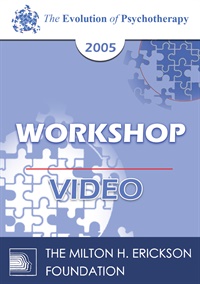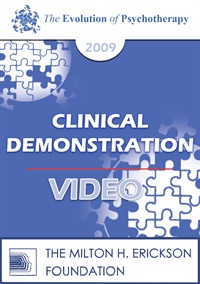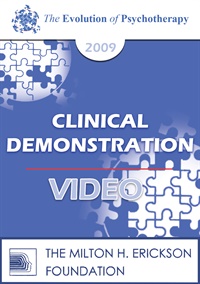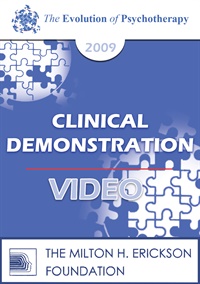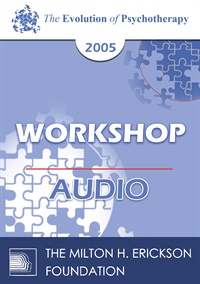
- Average Rating:
- Not yet rated
- Topic Areas:
- Workshops | Psychotherapy | Therapist Development
- Categories:
- Evolution of Psychotherapy | Evolution of Psychotherapy 2005
- Faculty:
- Robert Dilts, BA
- Duration:
- 2 Hours 36 Minutes
- Format:
- Audio Only
- Original Program Date:
- Dec 10, 2005
- Short Description:
- Identity has to do with such questions as "Who am I?"; "What are my limits?"; "What is my purpose?" Clarifying the deep structure of our identity allows us to express ourselves even more fully at the level of our behavioral surface structure. It involves: Finding and clarifying our life's direction; managing boundaries between self and others; becoming clear about beliefs that support our identity and those which limit us; expanding our sense of self, and incorporating new dimensions of being.
- Price:
- $15.00 - Base Price
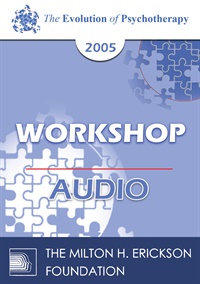
- Average Rating:
- Not yet rated
- Topic Areas:
- Workshops | Psychotherapy
- Categories:
- Evolution of Psychotherapy | Evolution of Psychotherapy 2005
- Faculty:
- Nicholas Cummings, PhD
- Duration:
- 2 Hours 36 Minutes
- Format:
- Audio Only
- Original Program Date:
- Dec 10, 2005
- Short Description:
- EP05 Workshop 31 - Behavioral Health as Primary Care: Psychotherapy's Future as a Primary Care Profession - Nicholas Cummings, Ph.D. Co-faculty: William O'Donohue, Ph.D. Several large health systems are now co-locating behavioral care providers (BCPs, Primarily psychologists and social workers) in the primary care setting, side-by-side with primary care physicians (PCPs). Research has already shown when a PCP can walk the patient down the hall to the BCP's office, 90% of patients engage in treatment as opposed to only 10% of referrals today. This presages opportunities for psychotherapists who wish to participate, and this workshop will address how to anticipate, prepare and avoid the pitfalls of a new integrated behavioral/primary care delivery system.
- Price:
- $15.00 - Base Price
- Average Rating:
- Not yet rated
- Topic Areas:
- Workshops | Dreamwork | Psychotherapy
- Categories:
- Evolution of Psychotherapy | Evolution of Psychotherapy 2005
- Faculty:
- James Hillman, PhD
- Course Levels:
- Master Degree or Higher in Health-Related Field
- Duration:
- 1:52:44
- Format:
- Audio and Video
- Original Program Date:
- Dec 11, 2005
- Short Description:
- Dreaming is a natural human function from early childhood to late maturity. Beginning with Freud and Jung the practice of clinical psychology centered originally on dream analysis. The importance of dreaming has fallen into neglect in most contemporary therapies. This workshop offers practical cues for working with dreams to benefit participants own techniques, selfknowledge and their client's psychic equilibrium.
- Price:
-
Sale is $29.00
price reduced from Base Price - $59.00
Tags: Dreams James Hillman Psychotherapy
- Average Rating:
- Not yet rated
- Topic Areas:
- Workshops | Personality Disorders | Psychotherapy
- Categories:
- Evolution of Psychotherapy | Evolution of Psychotherapy 2005
- Faculty:
- Otto Kernberg, MD
- Course Levels:
- Master Degree or Higher in Health-Related Field
- Duration:
- 2:03:54
- Format:
- Audio and Video
- Original Program Date:
- Dec 11, 2005
- Short Description:
- EP05 Workshop 35 - Etiology, Psychotherapy. Diagnosis and Treatment Indicators for Severe Personality Disorders - Otto Kernberg, M.D. Present day knowledge and leading hypotheses regarding severe personality disorders will be reviewed, and their relationship to clinical characteristics of these patients clarified. A critical review of present classification will be followed by exploration of specific technical approaches to diagnostic interviewing and decision-making regarding specific therapeutic approaches to each patient.
- Price:
-
Sale is $29.00
price reduced from Base Price - $59.00
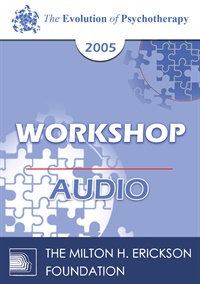
- Average Rating:
- Not yet rated
- Topic Areas:
- Workshops | Psychotherapy
- Categories:
- Evolution of Psychotherapy | Evolution of Psychotherapy 2005
- Faculty:
- Cloe Madanes, HDL, LIC
- Duration:
- 1 Hour 58 Minutes
- Format:
- Audio Only
- Original Program Date:
- Dec 11, 2005
- Short Description:
- EP05 Workshop 39 - The Five Most Dangerous Trends in the Field of Psychotherapy and How to Overcome Them - Cloe Madanes Co-faculty: Anthony Robbins We are living in difficult times as the field of psychotherapy faces obstacles that threaten its very existence. Most therapists' incomes are not what they should be and neither is our position in the intellectual community. Madanes and Robbins will discuss the trends that we need to reverse and will present strategies to overcome these obstacles.
- Price:
- $15.00 - Base Price
- Average Rating:
- Not yet rated
- Topic Areas:
- Clinical Demonstrations | Experiential Therapy | Psychotherapy | Therapist Development | Treatment Planning
- Categories:
- Evolution of Psychotherapy | Evolution of Psychotherapy 2009
- Faculty:
- Jeffrey Zeig, PhD
- Course Levels:
- Master Degree or Higher in Health-Related Field
- Duration:
- 58:41
- Format:
- Audio and Video
- Original Program Date:
- Dec 11, 2009
- Short Description:
- EP09 Clinical Demonstration 01 - Essentials of Experiential Therapy - Jeffrey Zeig, PhD
- Price:
-
Sale is $29.00
price reduced from Base Price - $59.00
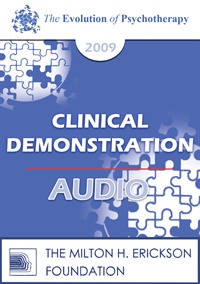
- Average Rating:
- Not yet rated
- Topic Areas:
- Clinical Demonstrations | Psychotherapy | Therapist Development
- Categories:
- Evolution of Psychotherapy | Evolution of Psychotherapy 2009
- Faculty:
- Harville Hendrix, PhD
- Duration:
- 51:23
- Format:
- Audio Only
- Original Program Date:
- Dec 11, 2009
- Short Description:
- Educational Objectives: To describe two patterns used for a behavior change. Given a patient with a behavior problem, propose a behavior change dialogue.
- Price:
- $15.00 - Base Price
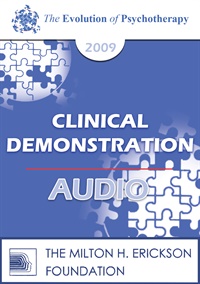
- Average Rating:
- Not yet rated
- Topic Areas:
- Clinical Demonstrations | Cognitive Behavior Therapy (CBT) | Eating Disorders | Psychotherapy | Weight Loss
- Categories:
- Evolution of Psychotherapy | Evolution of Psychotherapy 2009
- Faculty:
- Judith Beck, PhD
- Duration:
- 56 Minutes
- Format:
- Audio Only
- Original Program Date:
- Dec 11, 2009
- Short Description:
- Educational Objectives: To identify three sabotaging thoughts of dieters. To describe a response for each sabotaging thought.
- Price:
- $15.00 - Base Price
- Average Rating:
- Not yet rated
- Topic Areas:
- Clinical Demonstrations | Strategic Therapy | Couples Therapy | Psychotherapy
- Categories:
- Evolution of Psychotherapy | Evolution of Psychotherapy 2009
- Faculty:
- Cloe Madanes, HDL, LIC
- Course Levels:
- Master Degree or Higher in Health-Related Field
- Duration:
- 55:41
- Format:
- Audio and Video
- Original Program Date:
- Dec 11, 2009
- Short Description:
- Educational Objectives: To name two strategies for therapy. To list three important questions to ask in therapy.
- Price:
-
Sale is $29.00
price reduced from Base Price - $59.00
- Average Rating:
- Not yet rated
- Topic Areas:
- Clinical Demonstrations | Mindfulness | Psychotherapy
- Bundle(s):
- Learning Track - Mindfulness
- Categories:
- Evolution of Psychotherapy | Evolution of Psychotherapy 2009
- Faculty:
- Daniel Siegel, MD
- Course Levels:
- Master Degree or Higher in Health-Related Field
- Duration:
- 54:43
- Format:
- Audio and Video
- Original Program Date:
- Dec 11, 2009
- Short Description:
- Daniel Siegel (2009) Mindsight and Integration in the Cultivation of Well-Being demonstrates interpersonal neurobiology therapy with a volunteer studying to be a therapist. She has experienced fear in one clinical setting and has also been “the glue,” holding together her family since she was young. Siegel uses the triangle of relationship/ mind/brain to help the volunteer experience her fear of responsibility by allowing images and body sensations to flow to “soften the mind.”
- Price:
- $59.00 - Base Price
Tags: Mindfulness Psychotherapy
Please wait ...


